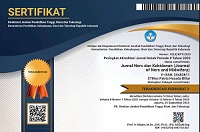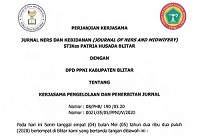Positive Affirmations Affected the Postpartum Blues Mental Health
DOI:
https://doi.org/10.26699/jnk.v11i1.ART.p092-098Keywords:
postpartum blues, mental health, perceived social support, positive affirmationsAbstract
Indonesia is currently being hit by the Covid-19 virus, while the incidence of postpartum blues is increasing, one of the influencing factors is the decline in mental health and perceived social support. The objetive of the research was to prove the effect of positive affirmations on mental health, perceived social support for postpartum blues mothers. This was analytic research with true experimental method, with randomized controlled, pretest-posttest design with control group. The number of samples was 40 respondents; 20 intervention respondents and 20 control respondents. The intervention group was given positive affirmation videos for 10 minutes, 5 times every day. The data obtained from the questionnaire. The analysis used to assess the variables was a paired sample test. To assess the differences in the two groups using the Independent T-test. The result showed the improvement in mental health before the intervention was 28.3 this value included weight. After the intervention was given, it was 13.3 in the normal category. The increase in perceived social support, before the intervention was given, was 24.7 the value was included in the low category, after being given the intervention, it was 38.4 in the medium category. The p-value before and after the positive affirmation technique treatment has a p-value <0.05, so there is a difference after being given positive affirmations, namely increasing mental health and perceived social support. Giving positive affirmations can improve mental health and perceived social support in postpartum blues mothers.
References
Baran, J., Leszczak, J., Baran, R., Biesiadecka, A., Weres, A., Czenczek-Lewandowska, E., & Kalandyk-Osinko, K. (2021). Prenatal and Postnatal Anxiety and Depression in Mothers during the COVID-19 Pandemic. Journal of Clinical Medicine, 10(14), 2–10. https://doi.org/10.3390/jcm10143193.
Brandrick, C., Hooper, N., Roche, B., Kanter, J., & Tyndall, I. (2021). A Comparison of Ultra-Brief Cognitive Defusion and Positive Affirmation Interventions on the Reduction of Public Speaking Anxiety. Psychological Record, 71(1), 109–117. https://doi.org/10.1007/s40732-020-00432-z.
Chen, P.-J., Yang, L., Chou, C.-C., Li, C.-C., Chang, Y.-C., & Jen-Jiuan Liaw. (2017). Effects of prenatal yoga on women’s stress and immune function across pregnancy: A randomized controlled trial. Complementary Therapies in Medicine, 31, 109–117. https://doi.org/10.1016/j.ctim.2017.03.003.
Dambi, J. M., Corten, L., Chiwaridzo, M., Jack, H., Mlambo, T., & Jelsma, J. (2018). A systematic review of the psychometric properties of the cross-cultural translations and adaptations of the Multidimensional Perceived Social Support Scale (MSPSS). Journal of the American Academy of Dermatology, 70(5), AB195. https://doi.org/10.1016/j.jaad.2014.01.810.
Fitria, I., Permatasari, D. P., & Nurwanti, R. (2020). Peran maternal self-efficacy sebagai mediator antara perceived social support dan depresi peripartum. Persona:Jurnal Psikologi Indonesia, 9(1), 170–188. https://doi.org/10.30996/persona.v9i1.3230.
Grey, I., Arora, T., Thomas, J., Saneh, A., Tomhe, P., & Abi-Habib, R. (2020). The role of perceived social support on depression and sleep during the COVID-19 pandemic. Psychiatry Research, 293(May), 113452. https://doi.org/10.1016/j.psychres.2020.113452.
Gurnita, F. winda, Suwondono, A., & Astuti, R. S. E. P. (2020). Faktor Yang Mempengaruhi Tingkat Kesemasan Postpartum Primipara. JIKA, 4(2), 42–46. https://doi.org/https://doi.org/10.36409/jika.v4i2.94.
Harrison, V., Moulds, M. L., & Jones, K. (2021). Perceived social support and prenatal wellbeing ; The mediating effects of loneliness and repetitive negative thinking on anxiety and depression during the COVID-19 pandemic. Women and Birth, 35(1), 10. https://doi.org/10.1016/j.wombi.2020.12.014.
Ikatan Bidan Indonesia. (2018). Kebidanan Teori dan Asuhan (Runjati & S. Umar (eds.)). EGC.
Kementerian Kesehatan, R. (2020). Pedoman Bagi Ibu Hamil,Bersalin, Nifas, dan Bayi Baru LAahir. Kementerian Kesehatan RI.
Li, S., Wu, Y., Zhang, F., Xu, Q., & Zhou, A. (2020). Self-affirmation buffering by the general public reduces anxiety levels during the covid-19 epidemic. Acta Psychologica Sinica, 52(7), 886–894. https://doi.org/10.3724/SP.J.1041.2020.00886.
Manuela, F., Barcos-Munoz, F., Monaci, M. G., Lordier, L., Camejo, M. P., De Almeida, J. S., Grandjean, D., Hüppi, P. S., & Borradori-Tolsa, C. (2021). Maternal Stress, Depression, and Attachment in the Neonatal Intensive Care Unit Before and During the COVID Pandemic: An Exploratory Study. Frontiers in Psychology, 12(October). https://doi.org/10.3389/fpsyg.2021.734640.
Musfiroh, S., Yulianti, R. T., Nabilah, A., Marnisa, F. B., Enjel L, I. A., Fransiska, O., Amalia, R., & Aisyah, Z. N. (2023). Literature Review: Hubungan Hormon Dan Psikologi Pada Ibu Masa Perinatal. Jurnal Maternitas Kebidanan, 8(2), 205–219.
Nanjundaswamy, M. H., Shiva, L., Desai, G., Ganjekar, S., Kishore, T., Ram, U., Satyanarayana, V., Thippeswamy, H., & Chandra, P. S. (2020). COVID-19-related anxiety and concerns expressed by pregnant and postpartum women—a survey among obstetricians. Archives of Women’s Mental Health, 23(6), 787–790. https://doi.org/10.1007/s00737-020-01060-w.
O’Neill, P., Cycon, A., & Friedman, L. (2019). Seeking social support and postpartum depression: A pilot retrospective study of perceived changes. Midwifery, 71(2019), 56–62. https://doi.org/10.1016/j.midw.2019.01.003.
Padoli, P., Suwito, J., & Hariyanto, T. (2020). Self Affirmation Reduces the Anxiety, LDH and Troponin I in the Clients with Coronary Heart Disease (CHD). Jurnal Ners, 14(3), 310. https://doi.org/10.20473/jn.v14i3.17170.
Palupi, P. (2020). Studi Fenomenologi: Pengalaman Primipara Saat Mengalami Depresi Postpartum. Jurnal Persatuan Perawat Nasional Indonesia (JPPNI), 4(2), 81. https://doi.org/10.32419/jppni.v4i2.181.
Paul, M. T., & Devi, U. (2021). Managing mental & psychological wellbeing amidst COVID-19 pandemic : Positive psychology interventions. The American Journal of Humanities and Social Sciences Research (THE AJHSSR), 04(03), 121–131. https://doi.org/https://doi.org/10.48550/arXiv.2104.11726.
Perzow, S. E. D., Hennessey, E.-M. P., Hoffman, M. C., Grote, N. K., Davis, E. P., & Hankin, B. L. (2021). Mental health of pregnant and postpartum women in response to the COVID-19 pandemic. Journal of Affective Disorders Reports, 4(100123), 1–7. https://doi.org/10.1016/j.jadr.2021.100123.
Peter, P. J., de Mola, C. L., de Matos, M. B., Coelho, F. M., Pinheiro, K. A., da Silva, R. A., Castelli, R. D., Pinheiro, R. T., & Quevedo, L. A. (2017). Association between perceived social support and anxiety in pregnant adolescents. Revista Brasileira de Psiquiatria, 39(1), 21–27. https://doi.org/10.1590/1516-4446-2015-1806.
Prasetyo, E. (2022). Quantum Affirmation. Guemedia Group.
Rahayu, D. E. (2020). Efektifitas Terapi Musik Terhadap Pencegahan Postpartum Blues Pada Ibu Primipara. Jurnal for Quality in Women’s Health, 3(2), 253–257. https://doi.org/10.30994/jqwh.v3i2.95.
Rahayu, E. P., & Rizki, L. K. (2020). The Effect of Positive Affirmations to Anxiety level and 2nd stage of labor length. STRADA Jurnal Ilmiah Kesehatan, 9(2), 900–905. https://doi.org/10.30994/sjik.v9i2.398.
Rahmaningtyas, I., Winarni, S., Mawarni, A., & Dharminto. (2019). Hubungan Beberapa Faktor dengan Kecemasan Ibu Nifas Di Wilayah Kota Semarang. Jurnal Kesehatan Masyarakat, 7(4), 7. https://doi.org/http://ejournal3.undip.ac.id/index.php/jkm.
Rezaie-Keikhaie K, Arbabshastan ME, R. H., & Amirshahi M, O. S. & A. A. (2020). Systematic Review and Meta-Analysis of the Prevalence of the Maternity Blues in the Postpartum Period. 2. J Obstet Gynecol Neonatal Nurs, 49, 127–136.
Rezaie-Keikhaie, K., Arbabshastan, M. E., Rafiemanesh, H., Amirshahi, M., Ostadkelayeh, S. M., & Arbabisarjou, A. (2020). Systematic Review and Meta-Analysis of the Prevalence of the Maternity Blues in the Postpartum Period. JOGNN - Journal of Obstetric, Gynecologic, and Neonatal Nursing, 49(2), 127–136. https://doi.org/10.1016/j.jogn.2020.01.001.
Ristanti, A. D., & Masita, E. D. (2020). THE INFLUENCE OF HUSBAND ’ S SUPPORT ON HEALTH-SEEKING BEHAVIOR IN MADURESE MOTHERS WITH POSTPARTUM BLUES. The 7th International Conference on Public Health, 63–68. https://doi.org/https://doi.org/10.26911/the7thicph-FP.03.13.
Saleha, N., Delfina, R., Nurlaili, N., Ardiansyah, F., & Nafratilova, M. (2021). Online Affirmation and Peer Support are Effective for Reducing Medical Personnel Stress in Dealing with Covid-19 Patients. Unnes Journal of Public Health, 10(2), 151–161. https://doi.org/10.15294/ujph.v10i2.42861.
Soetrisno, S., Respati, S. H., Sulistyowati, S., & Kurniawan, H. (2017). the Impacts of Stimulation in Protracted Labor To Cortisol Levels and Incidence of Post-Partum Blues. Folia Medica Indonesiana, 53(1), 7–11. https://doi.org/10.20473/fmi.v53i1.5483.
Walyani, E. S., & Endang Purwoastuti. (2017). Asuhan Kebidanan Masa Nifas dan Menyusui. Pustakabarupers.
Zhang, S., Wright, G., Kingston, M. A., & Rolfe, P. (1996). The Structure Of Negative Emotional States: Comparison Of The Depression Anxiety Stress Scales (DASS) With Back Depression And Anxiety Inventories. Medical and Biological Engineering and Computing, 34(4), 313–315. https://doi.org/10.1007/BF02511245.
Downloads
Published
How to Cite
Issue
Section
License
Copyright (c) 2024 Jurnal Ners dan Kebidanan (Journal of Ners and Midwifery)

This work is licensed under a Creative Commons Attribution-ShareAlike 4.0 International License.






